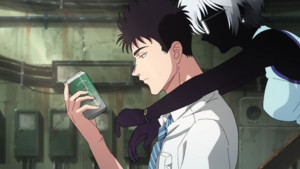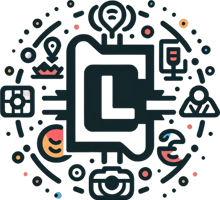
© 眉月じゅん/集英社・「九龍ジェネリックロマンス」製作委員会
Who knew French toast could be such a relationship deal-breaker? Kudo’s shitty treatment of Kujirai A in this episode stems from his continued inability to move on from Kujirai B, and even little things remind him that this new version of the woman he supposedly loves can’t measure up to the version in his memory. Last time, much to Kujirai A’s ecstatic delight, the two of them finally hooked up, and now we see the briefest of flashbacks to Kudo’s intimate POV, his lover’s radiant smile and flushed face beneath him as they make love. Their reactions couldn’t be more different. Kujirai A can’t stop blushing and giggling like a schoolgirl, promising to spill all the details to gal-pal Yaomay later. Kudo, by comparison, drinks alone in a dingy back alley. A spectral Kujirai B wraps her arms around his upper body, symbolic of the emotional immobility keeping him rooted to the past. Even while he envisages Kujirai A at her most vulnerable, giving herself wholly to him, he’s unable to do the same; his head is full of Kujirai B.
From Kudo’s flashback, we learn the original Kujirai learned the recipe for French toast from her mother, who, along with her father, died when she was a child. Perhaps that helps partly explain the persistent air of barely disguised hopelessness and ennui that seems to follow Kujirai B like a cloud. She’s suffered from loss all her life, and now, she’s about to lose her beloved Second Kowloon home. Her response to Kudo that “I’m weak, that’s why I’m not sad,” raises all kinds of red flags about her self-perception and emotional numbness. Frustratingly, her spiel about what memories mean to her is interrupted by a whistling kettle. This kind of thing happens a lot in Kowloon, it seems.
Somehow, to Kudo, the French toast episode is a cherished memory, so when he visits Kujirai A, not long after first promising never to leave her, and then sleeping with her, he seemingly “tests” her by asking her to make French toast. When it becomes obvious she doesn’t retain such knowledge gleaned from her predecessor, Kudo essentially ghosts her without warning, leaving the poor dear reeling. I don’t blame her – Kudo’s the master of mixed signals, no wonder Kujirai A doesn’t know whether she’s coming or going with him. Bereavement or not, his treatment of her is disrespectful and perhaps even manipulative. He doesn’t even seem to know what he wants, and until he sorts that out, he’d be better off leaving Kujirai A alone, even if that hurts her in the short term. I mean, not even her goldfish likes him.
On the theme of interrupted thoughts, Yaomay’s reaction to drinking Kowloon-sourced iced coffee is disturbing. One moment she’s relating to Gwen and Kujirai about her adventures in Hong Kong, then she takes a swig and it’s like her mind is suddenly emptied of any thoughts that might be problematic to Kowloon 3.0’s existence. Suddenly, she’s no longer perturbed that Kowloon 3.0 is trapped in an eternal, recursive midsummer, with outsider Yulong commenting “I knew she’d be swallowed up.” What is this place that rewrites memories, can alter appearances, and can produce doppelgangers? Gwen’s entirely correct in his continued aversion to eating or drinking this unsettling underworld’s produce. It’s like a pitcher plant, attracting insects with sweet nectar, only to trap and drown them slowly. In Kowloon 3.0’s case, what is the nectar that attracts people like Yaomay, Miyuki, Gwen, and Kudo, and why only them?
I feel sorry for Gwen, as Miyuki treats him so coldly here. Even though Gwen attempts to cover Miyuki’s failed electronic payment at a local business, Miyuki slithers away, even forcibly obstructing Gwen’s attempt to follow him. “We broke up,” he sneers, “I’m not as well-bred as I look,” referencing his upbringing among the labyrinthine passageways of the second Kowloon, before his adoption by Hebinuma Senior. It’s been hinted that one of the reasons the Hebinuma corporation demolished Second Kowloon was to destroy Miyuki’s birth records. This is the reason I assume Miyuki tracks down Dr Wong’s Kowloon clinic, but as is becoming a theme here, he’s interrupted before entering the front door. Is this significant, somehow? Yulong seems worried about his serpentine friend’s Kowloon obsession and is keen to take desperate steps to bring him to his senses.
Unfortunately, Kujirai A seems instrumental to Yulong’s plans, and those of Hebinuma Senior. Yulong finds a bug under his table that he correctly intuits belongs to the adult male Xiaohei, who currently works as a spy in Kowloon 3.0 on behalf of Miyuki’s father. Hebinuma Senior, keen to test the limits of Generic Kowloon and the Generic people it has seemingly created, wishes Xiaohei to lure a Generic person outside of the city’s boundaries to see if they disappear. It doesn’t have to be Kujirai A, but he’ll accept her loss if no alternative is found. Yulong, by comparison, just wants Kujirai A dead, for reasons we don’t yet fully understand. All Kujirai A wants to do is find her place in life, preferably with the man she loves! She has no idea about these dark forces circling her.
Xiaohei (male) seems like a nice guy though. Yaomay likes him a lot, and she’s been shown to be a pretty decent judge of character so far. Although the show hasn’t yet been explicit about it, there’s plenty of evidence suggesting that Xiaohei (female) and Xiaohei (male) are the same person. They both share the same love of frilly dresses, and Xiaohei (male) regrets the fact that, due to his now-adult body shape, he no longer looks good in the Lolita style he previously favored. Their hair, eyes, and mouths are very similar too, and the fact he was acquainted with Kujirai B seems to clinch the connection.
It seems likely to me that Xiaohei (male) indeed previously looked and dressed like Xiaohei (female) three years ago when he lived in Second Kowloon. In the three years since demolition, puberty struck, and his body became much more masculine. I don’t think this is intended to be a transgender narrative per se, because he very much identifies as a male, but one who happens to love wearing frilly clothes. The reason why Xiaohei (female) hasn’t disappeared raises all sorts of questions about how Kowloon 3.0 identifies if a Generic can be replaced by an Original when they cross the city’s threshold. Is Xiaohei (male) so different from Xiaohei (female) that they’re counted as separate entities? Or is the way that Generics are generated somehow based on others’ perceptions? Could this reconstructed Xiaohei (female) physically be a girl, rather than a boy in a dress?
While we already have many answers about Kowloon 3.0’s true nature, there are still so many mysteries yet to be revealed about how any of this very peculiar setup works. I remain riveted by this adaptation as it moves into what presumably is its endgame. With this episode, we reach the end of manga volume eight. With only one English-translated volume to go, we’ll very soon be in uncharted territory for English-language readers. With Kujirai A’s inexplicable vision of Kujirai B’s memories through the lenses of her glasses, I hope they’ll bring us more answers soon!
Rating:
Kowloon Generic Romance is currently streaming on Crunchyroll on Saturdays.
Episodes 1-2
Episode 3
Episode 4
Episode 5
Episode 6
Episode 7
Episode 8
Episode 9

